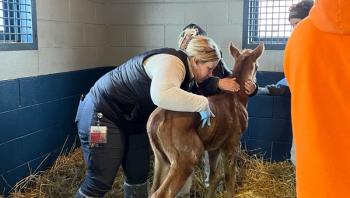
AVMA launches mentoring program to spur collegiality
Age is not a barrier to becoming a mentor; the program searches for a like match.
SCHAUMBURG, ILL.—The American Veterinary Medical Association (AVMA) created a new mentoring program to help veterinarians and veterinary students share information and build professional networks.
Officials unveiled the Web-based program, http://
Dr. Ron Cott
Dr. Ron Cott, associate dean for student and alumni affairs at the University of Missouri's College of Veterinary Medicine, tells DVM Newsmagazine, that while the program is still in its infancy, it needs veterinarians and students to get active. At presstime, the program enrolled about 100 DVMs; while it needs 500 to start the search process to match up mentors and mentees.
Cott, who is the chair of AVMA's Model Mentoring Program, adds that the program was created as a result of the KPMG "mega study" conducted by AVMA, American Animal Hospital Association and Association of American Veterinary Medical Colleges to address long-term professional and economic issues. This study cited retention of veterinarians as a potential issue, and this program is heralded as the answer.
The ultimate goal, Cott explains, will be to "support a greater sense of loyalty to the profession," as well as prepare the next generation of veterinarians to lead the profession through organized veterinary medicine.
The program is set up around the concept of sharing information among veterinarians.
Cott offers these benefits for mentors:
- Help practitioners stay current on "best practices" being taught in veterinary schools.
- Stimulate and renew enthusiasm for the profession through a new role as guide and advisor.
- Identify opportunities to enhance personal contributions to the future of the profession.
- Enhance self-awareness through exposure to diverse ideas and experiences.
Mentees gain:
- Access to resources to help make informed career decisions and to learn from experienced veterinarians.
- Build skills, knowledge and aptitudes.
- Develop relationships to assure personal growth, wellness and career enrichment.
- Create a sounding board for new ideas and a source for positive and constructive feedback.
Program developers wanted to make it easy for users to access, Cott says. Therefore, an interested veterinarian or veterinary student simply fills out an online form. Mentees list skills they wish to develop. Mentors complete a personal profile including their universal competencies. Once up and running, the program then searches its database for a like match.
AVMA reports that young veterinarians also have a lot to teach, especially to older practitioners who might not have experience in new procedures. So, age is not a barrier to becoming a mentor, the association reports.
The program is ripe for veterinary students looking to seek mentors to help fill a void with "particular gaps in your knowledge, skills, confidence level and understanding of the business."
The association, in partnership with Triple Creek Associates, created comprehensive mentor and mentee guidelines to help users through the process. Information offering tips on making that selection are included.
The guide states, "Before you make your final mentor selection, remember that an ineffective mentor can be worse for you than no mentor at all."
The guide cautions you on traits to watch out for including:
- The prospective mentor should be well respected by peers.
- The mentor should "not be insecure abut his/her own success.
- The mentor's workstyle should not be too different for yours (unless that is what you need).
- Work ethic should be similar.
- Mentor choice should be made on qualifications and mutual understanding of what is best for the mentee.
- Pay attention to potential conflicts of interest, the guidelines advise.
AVMA says that mentees have expectations as well. In fact, the association sets criteria including:
- Initiate and drive the relationship.
- Identify initial learning goals.
- Seek feedback.
- Take an active role in his or her own learning.
- Initiate monitoring and closure sessions.
- Allocate time and energy.
- Follow through on commitments or renegotiate appropriately.
Cott says that the topics up for consideration do not have to focus on veterinary medicine either. Business and career development topics are encouraged.
"You can get into any aspect to the profession you want; it does not all have to be veterinary related," Cott explains. "It could be retirement related. The goal is to exchange ideas; we are looking to create a win-win."
Newsletter
From exam room tips to practice management insights, get trusted veterinary news delivered straight to your inbox—subscribe to dvm360.




